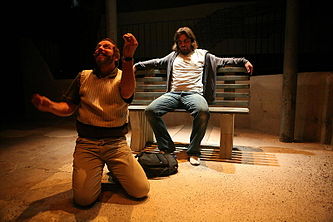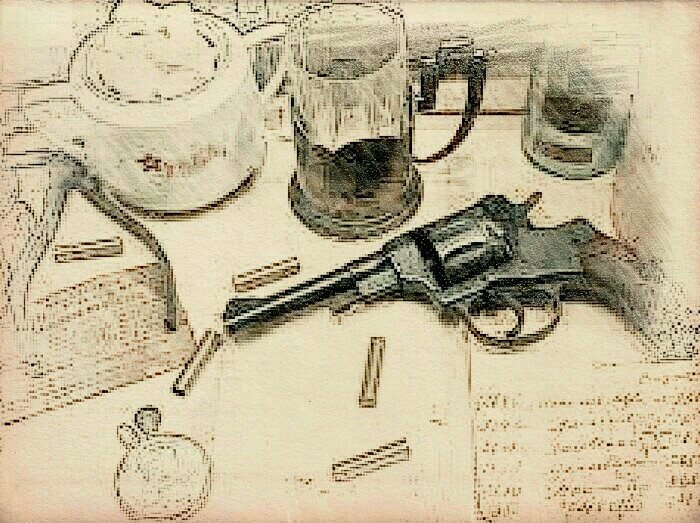Morality is the prescribed format of the society that constantly guards human behavior. It postulates certain rules and regulations that at times are conducive for retaining peace and security in the world. Nonetheless, the fact that cannot be denied is that morals when stringently imposed on humans make them feel deprived of the freedom of choice. This creates a feeling of uneasiness in the people and provokes them to either abnegate their desires and/or personal choices by adopting mannerisms that conform to the social expectations or to entirely violate the social norms. In the first case, an individual becomes almost a clone of a so-called breed called ”the rational human being” that has a fixed way of thinking according to the society.
In the second case, an individual becomes a radical defiant and deliberately chooses to refute the guidelines of the social precepts. Either for or against the society, a human being sacrifices his individuality and assumes a false identity because of the struggle to ”survive” in the world. However, neither of these roles that one plays is ”real”. People pretend to show that they are within their comfort zones while they are actually uncomfortable in the designed social set-up. They wear a mask of propriety. Similarly, they become rebels in their attempt to revolt against the codified social system and wear the mask of impropriety. These two ostensibly contrary identities seem in fact the means adopted by people in order to be accepted by a “group” that rescues them from the sense of identity crisis.
The danger of being ostracized by one’s own species seems too heavy a price for an individual to pay. Therefore, the necessity of assuming a ”collective identity” forces the humans to remain within a confined territory from wherein they are kept under surveillance by the society. It can be understood that the people that consider themselves free are actually imprisoned as the prisoners in the apparently invisible societal Panopticon (a type of institutional building designed by the English philosopher and social theorist Jeremy Bentham in the late 18th century to constantly monitor the activities of the incarcerated criminals) comprised of judgmental perception that continually guards their activities and thus regulates their mannerisms. Humans therefore seldom behave the way they want to.
A universally accepted fact is that people are unable to exercise their volition in the society wherein constantly they have to perform or act as per the conditioned social rules. Therefore, we often find it extremely difficult to comprehend the ”truth” beneath the mask of regularity or irregularity in human beings’ deportment. People’s behavior seems manipulated by linguistic stereotypes” framed on an understanding moderated by logocentric viewpoint which refuses to go beyond the binary oppositions that attribute categorical labels like ”good” or ”bad” to them. When these contrary identities encounter each other, the outcome is devastation as their masked identities refuse to accept the fact that remains concealed beneath their outer reality. In Edward Albee’s (The American playwright -1928) play The Zoo story (1958), we have two such contradictory characters, Peter and Jerry who happen to meet each other in a park.
Peter sitting on the park bench of New York City tries his best to appear comfortable within the comfort zone but perhaps he knows he is lying as when he meets Jerry, a man who introduces himself as coming from Central Park Zoo and brings out sordid realities of his lonely life, unsavory neighbors, his conventionally disapproved liaison with a boy and with his hysterical or rather bizarre attempts to murder a dog etc., Peter experiences an utter sense of discomfiture. He wishes to quit the place immediately with Jerry forcefully trying to retain him and in the same struggle, we find that the truth of living a fake life in the pretext of being a ”Normal Man” is depressing while equally frustrating is the attempt to refute the code of normalcy that is designed by the society.
Both Peter and Jerry perhaps are each other’s alter-ego trying to scare them out of their wits by showing them the distorted mirror. Having a so-called good job, a family, pets etc., does not make Peter, the man sitting comfortably on the park bench of New York City, a comfortable man. Jerry, the man that appears introducing himself as coming from the Central Park Zoo, becomes the medium through which Peter perhaps realizes that he is lying if he says or behaves as if he were fine. He tries to incessantly disturb Peter’s apparently peaceful state as he perhaps gets uncomfortable seeing Peter’s hypocritical comfort which makes him loathe his state isolation metaphoric of being ostracized from the so-called normal society.
He longs for a conversation. He wants someone to talk to him and as he finds Peter, he grabs the opportunity for the same. This craving for dialogue on Jerry’s part denotes the sense of despair that creeps in the people who despite being a part of the ”Zoo” or the ”Crowd” are left unnoticed just because they are perhaps unconventional in their approach towards life and do not wish to continue doing what the society perhaps expects them to do. Peter is in sync with the social codes of conduct and regulatory behavior and therefore it seems he tries to ignore Jerry because he realizes that he is not in coordination with the expected precepts which are regarded as inevitable for someone to be recognized as a ”Member of a Group”.
Peter does not wish to be isolated. He already has a family and stays within a society. The Park Bench on which he is sitting symbolizes a ”public place” which gives the scope of observation to a ”Mob”. He knows that he is seen, noticed and is perhaps talked about. Therefore, when he meets the rowdy Jerry, he tries to avoid him, his talk and attempts behaving in a way that could make him appear ”Sane” as per the social notion. It can also be interpreted that Jerry who belongs to the Zoo epitomizes perhaps the radical side of Peter – the one that wishes to liberate from the confines of the crowd and dismiss the panopticon theory. Thus, it seems he constantly acts weird in a way that would enable him to undermine the prescribed rules and regulations of regulatory human behavior.
However, in an apparent attempt to be radical, Jerry fails miserably when he takes resort to killing himself in the end as he is unable to provoke peter to defy the set norms. Jerry’s death seems metaphoric of the death of his masked identity of a radical defiant. It is the false appearance that surrenders in the end acknowledging the truth that the panopticon framework of the society which forces one to assume an unreal identity is indomitable. Thus perhaps he accepts his death and thanks Peter for relieving him from the state of limbo. His words at the end do indicate this thought ”Could I have planned all this. No… no, I couldn’t have. But I think I did”. When Peter runs away from the scene immediately trying to save himself from the eyes of the passersby, it implicates the fact that avoidance of truth is perhaps the only means to live in the society.
Therefore, he just rushes off the park without letting people note Jerry’s death which would perhaps get him into trouble of being accused of murder. He does not forget to carry his book with him which it seems represents his act of behaving normal as if nothing has happened and also that he perhaps does not wish to leave a tinge of proof regarding his presence in the park. Peter goes back into the so-called normal world. Jerry’s death perhaps symbolizes the death of the maverick in him who tried to jolt him of his reverie of being normal but submitted in front of the lethal social network which observes people and draws conclusions based on binary opposites. Jerry perhaps tried to rebel but the reaction against the conformity apparent in his refractory behavior synonymous to animals in the Zoo indicates his adopted identity as against his true self which fails him in the end.
If Peter is unnatural in his behavior, Jerry too is unreal as he pretends to be unnatural just because he perhaps has distaste for the so-called real and natural which stimulates the urge in him to upset everything that appears in accordance with the norms of the society represented by Peter in the play. Both the characters in the end succumb to the conformity; one by dying and losing his life and the other by accepting the social pretense. Panopticon consumes them both; each in their own respect.
I feel The Zoo Story can be best conceived for the stage than a film. Panopticon model is inherent in the image of a stage surrounded by the audience giving the characters the authentic feel of being ”observed” or being constantly under surveillance. This perhaps is capable of making their performance genuinely ”Unnatural” which I feel is the mandate for the presentation. In front of a camera, for the film, I personally feel, the characters may or may not experience the jeopardy of being ”image conscious” implied in the play.
Instead, I feel, they may on the other hand become conscious of their ”image” on camera in the apparel of two characters. In other words, in an attempt to genuinely become Peter and jerry, I feel the characters doing a Zoo Story film may encounter a predicament of becoming a director’s conception of ”actors” facing a camera essaying a ”role”. On stage, the characters in theater have a benefit of understanding the requirement of becoming Peter and Jerry when they portray these characters as they know they are ”being watched” live by those that have the habit of making ”Judgments.” However, in the end, it stands true that good actors know their job be it theater or film!
For Panopticon please refer: https://www.ucl.ac.uk/Bentham-Project/who/panopticon
For Zoo Story: Albee, Edward. The Zoo Story. Samuel French Ltd. 1998.














